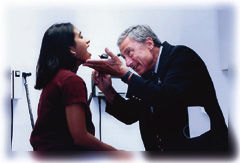![]()
Main Menu · Search · Current Issue · Contact · Archives · Centennial · Letters to the Editor · FAQs
![]()
Main Menu · Search · Current Issue · Contact · Archives · Centennial · Letters to the Editor · FAQs
 | |
  | |
 From top, left to right: Harvard's hygiene laboratories circa 1899; prevention as taught from 1925-1935 under Oliver professor Alfred Worcester; benefactor Henry Kemble Oliver; current UHS director and Oliver professor David Rosenthal. HARVARD UNIVERSITY ARCHIVES AND (ROSENTHAL) UNIVERSITY HEALTH SERVICES From top, left to right: Harvard's hygiene laboratories circa 1899; prevention as taught from 1925-1935 under Oliver professor Alfred Worcester; benefactor Henry Kemble Oliver; current UHS director and Oliver professor David Rosenthal. HARVARD UNIVERSITY ARCHIVES AND (ROSENTHAL) UNIVERSITY HEALTH SERVICES |
"One morning in 1850, Harvard undergraduate Henry Kemble Oliver [A.B. 1852, M.D. 1855] awakened feeling out of sorts. Later that day, concerned that he might be feeling the early symptoms of some unknown malady, he made his way to the Cambridge office of Dr. Morrill Wyman." So begins A Laboratory for Change, the centennial history of the Harvard University Health Services (UHS). Oliver, it seems, didn't get the care he wanted from Dr. Wyman, and never forgot it. Almost 50 years later, in 1899, he endowed a professorship in hygiene to care for the "physical welfare of the undergraduates," the genesis of what in time became UHS.
While UHS itself, and the buildings that have housed it, have grown considerably through the years, the ailments particular to students have changed little. The colds and flus that plague the general population still account for much misery, but there are also numerous afflictions that affect the undergraduate cohort more than others. UHS, says director David Rosenthal '59, M.D., the current Oliver professor, tries to address these in a way that no insurer or HMO not tailored to a college population could.
College students, for example, run a greater risk of contracting sexually transmitted diseases than other groups; UHS has been offering preventive advice (and cures) for years. In 1934, Alfred Worcester, A.B. 1878, M.D. 1883, the second Oliver professor, had this to say to the then all-male undergraduate body about the sex drive:
"[It] will bring to you and to others either richest blessing or wretched misery. Remember, then, for your soul's comfort, that you cannot possibly suppress this force, any more than you could suppress the electric current produced by a working generator, or any more than you can stop the circulation of your blood. No, that isn't your job. Your job, like that of the boss of the electric station, is to keep the power from running off through the wrong conductors."
Since Worcester's era, HIV has raised the stakes in the effort to prevent sexually transmitted disease, while other youth health risks remain largely unchanged. On November 19, in a daylong symposium honoring the UHS centennial, speakers addressed many of those health issues particular to the 17-24 age group, including smoking, drinking, depression, suicide, and eating concerns. Also discussed were the complexities of serving a diverse population with differing beliefs in the efficacy of Western-style medicine. (The placebo effect remains a powerful aspect of any treatment; the challenge lies in finding the right approach for each student.)
Earlier, in an interview, Rosenthal mentioned another reason why UHS is important: it can have a big impact on Harvard students' health long after college. Epidemiological studies of Harvard graduates have shown that habits formed during the college years are often lifelong. Good nutrition and adequate physical activity, avoidance of alcohol and cigarettes--in other words, self health care--begin not only at home, but at Harvard.
Main Menu · Search · Current Issue · Contact · Archives · Centennial · Letters to the Editor · FAQs
![]()